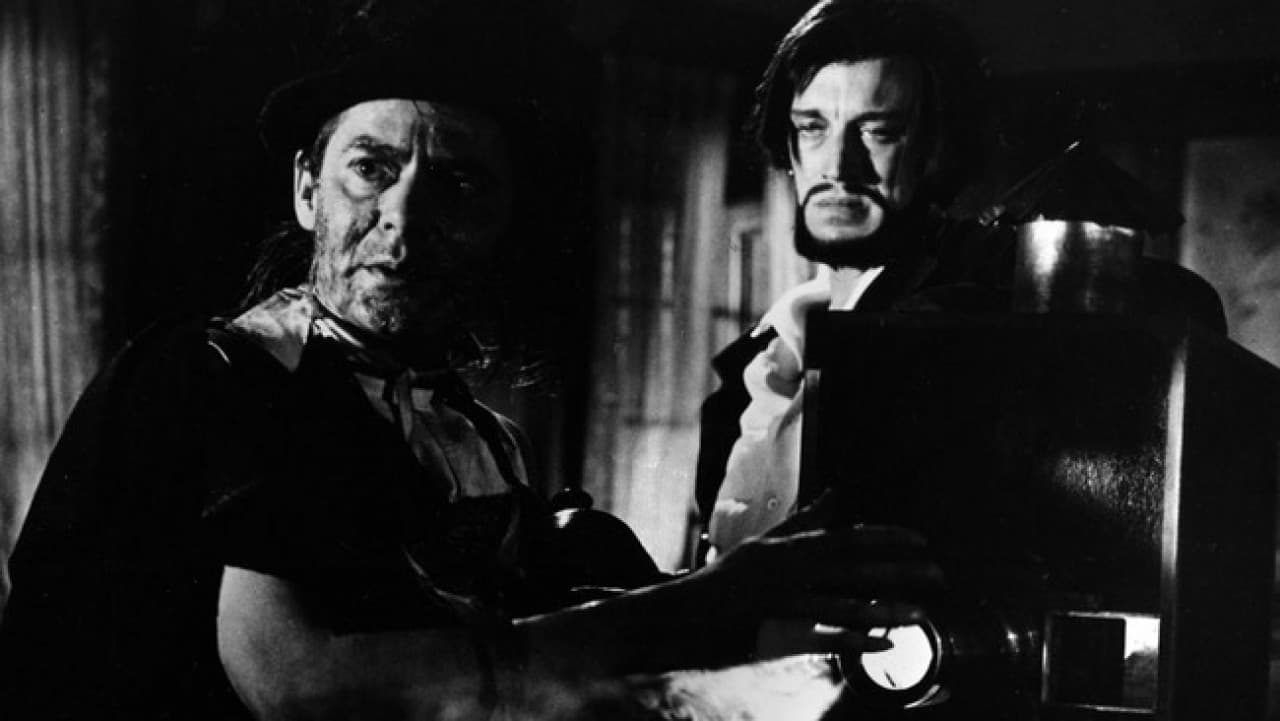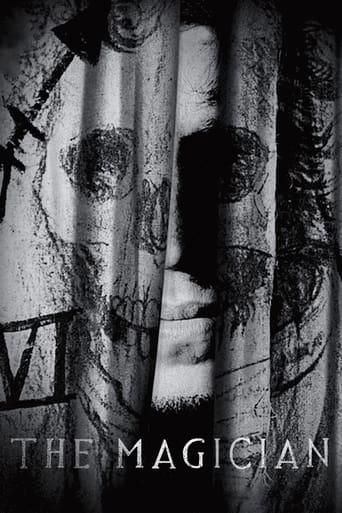SincereFinest
disgusting, overrated, pointless
Sexyloutak
Absolutely the worst movie.
CrawlerChunky
In truth, there is barely enough story here to make a film.
Claire Dunne
One of the worst ways to make a cult movie is to set out to make a cult movie.
willwoodmill
The Magician came out at the high point of the famous and fantastic Swedish director, Ingmar Bergman's career, it came out right after Wild Strawberries and The Seventh Seal and right before The Virgin Spring and his famous "Spider-God" or "God's silence" trilogy. But the magician has not been remembered in the same light as those films, in fact it's been mostly forgotten. The Magician follows Volger's Magnetic Health Theater a traveling performance troupe that is run by Albert Emmanuel Volger. (Played by Max Von Sydow.) Many authority figures are skeptical on whether they should be allowed to perform in public. So they are asked to come perform for Dr. Vergerus (played by Gunnar Björnstrand) and Police Superintendent Starbeck (played by Toivo Pawlo) at the house of the rich merchant Mr. Egerman. So that they can see if the performance is fit for public consumption. After watching the Magician I can see what it is less popular than The Seventh Seal and Wild Strawberries, it lacks the dark atmosphere and theological complexity of The Seventh Seal, and soft subtle human emotion and melancholy of Wild Strawberries. But even though The Magician lacks the depth of some of his other films, Ingmar Bergman's skill and style are still present. The Magician is mostly restrained to the large estate of Mr. Egerman, which is composed of some of the best sets I've seen in an Ingmar Bergman film, this gives the film a wonderful isolated feel. The film's isolated feel is only magnified when coupled with the film's sense of mystery, which makes for one very entertaining film.I really shouldn't even have to say this, considering it's an Ingmar Bergman film, but the acting is great. A lot of Bergman favorites like Max von Sydow, Gunnar Björnstrand, Ingrid Thulin, and Bibi Anderson all star in the Magician, and they're all as good as ever. Max Von Sydow deserves special praise, his character doesn't even speak until an hour through the film, but everything we need to know about him is told through his pose and facial expressions. His character is one that is filled with a deep sadness, he has clearly lived a difficult life but it know it is finally his chance to prove himself to real professionals. The films cinematography is on par with most Bergman films of the time. The film was shot by Gunnar Fischer, who has done wonders on some of Bergman's past films like The Seventh Seal and Smiles of a Summer Night and does wonders here. He captures the dark halls of Mr. Egermans estate perfectly.Even though I can see why The Magician is not considered as good as some of Ingmar Bergman's other films, it is still criminally under seen. The film is one of they most "comfy," Ingmar Bergman films out there. And sure it may not be as complex or beautiful as some of his other films it is still classic Bergman. And if you're an Ingmar Bergman fan you definitely don't want to pass this film up, but if you're not familiar with Bergman I would suggest checking out some of his more famous films before watching this one.7.9/10
MisterWhiplash
The Magician's original Swedish title is Ansiktet, which in Ingmar Bergman's language means 'The Face'. It's also worth noting (thanks to the Peter Cowie essay with the DVD) that the subtitle in the script is 'A Comedy'. Is much funny in this film? There is some absurdity - very dark, brooding, harrowing, sometimes horror-movie absurdity - but maybe it's there. There's even some humor to be had among the supporting characters, like the (for 1958 frank) sexual talk with Bibi Andersson's character and the younger man with the magician troupe. But it's all the same fascinating to see those two points - the fact that, as in many of Bergman's other films, the face is key as almost a plot device, and that he sees it as a comedy. But hey, so did Hitchcock with Psycho, right? The Magician is set in the mid 19th century and is Bergman right after the one-two punch of The Seventh Seal and Wild Strawberries continuing his cinematic inquest into truth and enlightenment. The conflict is not exactly plot driven, though there is a solid premise and a good story: a "Magical Health Troupe" (that may not be the exact wording, but 'health' is in there) arrives to do a performance - this includes the Magician Vogler (Max von Sydow) and his assistant "Mr" Vogler (Ingrid Thulin, dressed like a man for a little while) - for a heavily skeptical doctor and his group (other Bergman regulars include Erland Josephsson and Gunnar Bjornstrand, the latter being the doctor). This troupe carries some baggage with them - they've been in prison before, it's spoken of - and it's obvious just by Sydow's face, with a fake beard and dyed hair, that there's something 'funny' going on.Rationality and irrationality, that's what's at play here, and also the whole idea of what constitutes believing in something that's outside of the 'scientific' explanation. It's interesting to see that Dr. Vergerus (and this name would later pop up as antagonists in Bergman films, most notoriously in Fanny & Alexander) is probably more interested in doing the eventual autopsy of Vogler than really seeing any magic 'tricks' he has to offer - if they're tricks at all. And it's even noted that they are charlatans by one of the members in a key scene. But Bergman's aim here, and what drives things to be so moving and compelling and even touching, is how other characters react to these magicians, with their 'potions' and fortune telling. One of the doctor's wives actually takes a liking to Vogler - it should also be noted this is over the course of a night - and it's one of those scenes that is so striking for the tension in Sydow's face, how everything is building up inside of him.It may be almost a spoiler to say that Vogler can, in fact, speak and just chooses to use it as part of his disguise. But the conflict is constantly driven by the choices and world-views of these characters, and this goes too for a 'dying' actor who is seen early on in the film and... we assume he dies en route to the main part of the story, but he re-appears mid-way through to give Vogler some late-night advice before he departs again. Is this Bergman putting himself in the film, saying that whether you bring illumination and wonder and the unknown in the world that you're still mortal? Probably, and it certainly wouldn't surprise me.There are two main magic acts in the film, and they're both brilliant, awe-inspiring works if only on technical grounds: how characters move in the frame, the surprises that come to these people. One of these is a little quicker (the one you'll see involving 'invisible chains)). In the second, without saying too much, Vergerus does do an autopsy on a character late in the story, and this is something closest to a horror movie (ten years before Hour of the Wolf no less) and how Bjornstrand moves in this attic, how the elements may be playing 'tricks' on him, but most importantly how Bergman is making his own magic trick going on is shocking and a lot of fun. It's actually terrifying, and in the way that you may wonder how it's being done... or, maybe that's not true, you know so much of the conflict has led to this point in the story - between what is quantifiable to a villainous man of science (yes, in this story, villainous) and what may be unknown in the world of conjuring and pulling the imaginary out of thin air - and it's because of that that you can't turn away from what will come next, while Bergman uses all the tools of cinema (cinematography playing with light and shadow, ominous music, how the actors move and react in such a tight place).Some of the choices aren't great; I wondered why there was such BIG music near the end, it felt out of place. And I almost wished there were more 'little' moments in the film, like when the Granny character sings to one of the lady workers at the house and she slowly falls asleep. That's a really nice moment that adds to that hypnotic ambiance in The Magician. Yet I can't recommend it enough, especially to those just getting into the director's work. Not everyone here may be likable, matter of fact even the characters you're supposed to have most sympathy for are manipulative and jerky and full of angst. But do they make for some great drama? You betcha.
runamokprods
An outstanding looking, very odd mix of somewhat broad comedy, horror film, and (of course) Bergman's metaphysical musings. A band of traveling magicians, wanted by the law as charlatans, are pulled in for questioning and forced to perform for some upper class non-believers. The 'nothing-in-life is-what-it- seems' theme is strong, but does get repetitive, and at times you can see it coming. Also, on first viewing the elements didn't really feel like they fit together, and I found it a bit of a bumpy ride. The comedy made the dark side hard to take seriously, and the serious, creepy elements made the comedy feel all the more wedged in.That said they are a some amazing sequences that I know will stick with me, and I do feel haunted by the film. Many call it a masterpiece or close, and I'll certainly see it again.
yabullar
Most of Ingmar Bergman's films are meant to titillate the intellect. The Magician is no exception. It is rich with symbolism. I think it ranks right up there with "Death in Venice" on the list of misunderstood movies.I believe the most rewarding level of meaning in "The Magician" is the religious one. Bergman was often concerned with the implications of religious beliefs. And almost always from the attitude of doubt. Consider the lines in The Seventh Seal where the vicious monk, annoyed with the knight's persistence, asks, "Will you never stop asking questions?" and the knight replies resolutely, "No. Never."Watching this movie with the idea of Vogler as Jesus provides a perspective that informs the characters and their conduct. This melancholy magician, doubted and persecuted by the powerful, surrounded by strange and suspicious persons, is simultaneously visionary and earthy flesh and blood. He only wants to perform his miracles for the masses. Or is he a charlatan? What a powerful way to pose that question.

